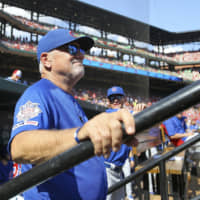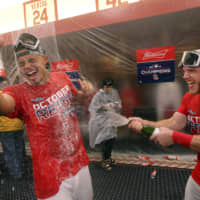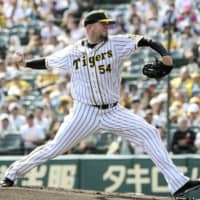For nearly 20 years Shinnosuke Abe’s go-to phrase during hero interviews, following some heroic feat on the baseball diamond, has been “saikō desu” (the best). He’d be asked a question and would often shout the phrase as his response as the crowd ate it up.
Abe is hardly the only player to do this, but it became one of his trademarks among Yomiuri fans. The phrase can even be found on the Abe-themed bento boxed lunches you can find at Tokyo Dome.
So when Giants fans are asked about their retiring talisman, one response they might give is a hearty “saikō desu!”
They wouldn’t be far off either.
Abe, who announced his retirement on Wednesday and wrapped up his 19th season on Saturday, finishes his career as one of the best catchers in NPB history.
At a position where offense is often regarded as a bonus, Abe was at times among the most productive hitters in the Central League and almost always among Japan’s better catchers.
“I know a lot of people remember him for his big hits and everything,” Giants reliever Scott Mathieson said, “but he was the best catcher, maybe in all of baseball, for a long time.”
On the NPB pantheon, Abe is easily in the group, maybe even at the front of it, directly behind Japan’s greatest backstop, Nankai Hawks legend Katsuya Nomura.
“Since his pro debut, I’d been thinking, ‘the only catcher who could pass me is Abe,’ ” Nomura told Nikkan Sports in comments released Sept. 25.
Abe was great behind the dish before, as is the case with catchers sometimes, the strain on his body pushed him to first base full time in 2016.
He donned the mask for 1,667 games, including in one final start on Friday at Tokyo Dome, and won four Golden Gloves. In 2006, he led the Central League with a .443 caught stealing percentage and led both leagues at .371 in 2010. According to Sports Hochi, his .996 career fielding percentage is fourth-best in league history.
Abe also had a great feel for what was going on and was skilled at working with pitchers and calling games. He was also reliable. Former Yomiuri closer Marc Kroon would say he only had the confidence to throw his forkball in tight spots because it was Abe behind the plate.
“One, he knows the pitchers, but two, he knows the hitters and he knows the game,” Mathieson said. “He’s very intelligent back there. He takes control of the game, he’s a coach on the field. He’s in control when he’s out there and that really helps everybody else out. You feel it when you’re pitching and you feel it when you’re out there.”
Abe would be remembered as a great player for his catching alone, but his offensive skills helped push him onto another level.
He retires with a .284 average, 406 home runs and 1,285 RBIs. His numbers put him among some of the other great hitting catchers, such as Nomura, Atsuya Furuta and Kenji Johjima.
Abe ranks in the top 20 on the career list in both home runs and RBIs. He was the CL MVP in 2012 and made nine Best Nine teams.
He’s one of only four catchers to win a batting title (with a .340 average in 2012) and one of only three to reach 400 home runs. He’s one of just two to spend the majority of his career at catcher and amass 2,000 hits and 400 home runs. The only other player in each of those clubs is Nomura, who hit .277 with 657 homers and 1,988 RBIs.
The veteran, who was the Giants’ captain from 2007-2014, will also be remembered for his leadership.
“Abe-san has been a team leader for awhile now and he’s a role model for many people,” said Yokohama BayStars manager Alex Ramirez, a former Yomiuri teammate. “I really had a great time playing with him. From Day 1, since he came to NPB he’s been the main guy. I learned so many things with him and we had a great time together. It’s an honor to be able to play with him.”
While last week was spent with Giants fans, and others around NPB, saying goodbye to Abe, the veteran still has one last chapter to write. He’ll play during the postseason and try to help Yomiuri win the Japan Series.
“This was like a memorial game, there was a (retirement) press conference, and it just seems like its going to make me cry,” Abe said after his final home game on Friday. “But I think I’ll cry if we become No. 1 in Japan.”
If that happens, he’ll probably say the whole thing was “saikō desu.”
Source : Baseball – The Japan Times


